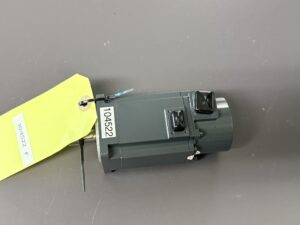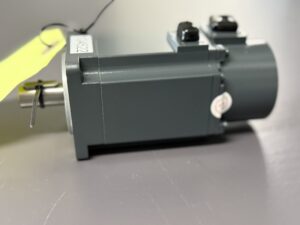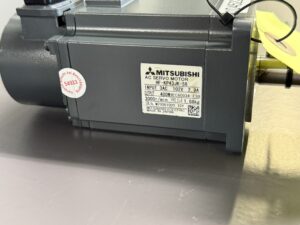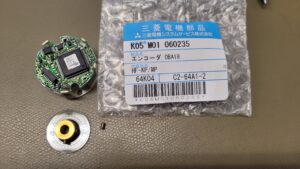01.05.2025 by Viktor Siebert
When Is It Worth Repairing Small Servo Motors Like the Mitsubishi HF-KP43JK-S6?
We are often asked:
“Is it even worth repairing such a small servo motor?”
It’s a valid question – especially when it comes to motors like the Mitsubishi HF-KP43JK-S6 with Encoder OBA18, a compact 400-watt servo drive.
And the answer, like so often in life, is: It depends.
Small Motors – Big Technology
What many people underestimate:
The smaller the motor, the more challenging the repair becomes.
These motors are true marvels of engineering – highly precise, finely built, and compact.
Opening one up feels almost like working on an expensive Swiss watch.
Every move has to be precise. One wrong step can throw the entire system off balance.
Repair Time Is (Almost) the Same
There’s a common misconception that smaller motors are cheaper to repair – but that’s only partially true.
The fact is:
A standard overhaul for a small motor also takes about 5 to 6 hours.
It hardly matters whether the motor is 400 W or 1 kW – the work involved is nearly the same:
Replacing bearings and seals, cleaning and repainting the housing, checking connectors and insulation, running tests, adjustments, and documentation.
Things get especially expensive if the encoder is defective.
Some of these feedback units now cost more than the motor itself did when it was new – if you can still get them at all.
So When Is It Still Worth Repairing?
The hard truth: Economically, repairing small motors often isn’t worth it.
But – and this is the key – what’s economically viable isn’t always what’s meaningful.
We see this again and again:
- No replacement available. The manufacturer has stopped production, and the motor is discontinued. Delivery times? Unknown.
- No retrofit possible. Machines are built specifically for that motor type. Retrofitting is technically or financially unfeasible.
- Sustainability. More and more customers are rethinking their approach. Why throw something away that can be restored with experience, precision, and care?
A Real-Life Example
One of our clients recently brought in this exact motor – the HF-KP43JK-S6 – and we carried out a full overhaul, including encoder replacement.
Here’s what we did:
- Preventive overhaul – replaced all worn and defective parts like bearings, seals, connectors
- Intensive cleaning – removed paint, degreased, cleaned thoroughly
- Repainting – for protection and a fresh appearance
- Test run & fine adjustment – ran extensive tests on our test bench and carried out final tuning
- Documentation – recorded and verified every step of the process
Our Conclusion: Small Things Matter Too
Is it worth repairing a small motor?
Ultimately, the customer decides.
What matters to us:
When there’s no alternative, when sustainability is important, or when the technology simply can’t be replaced – then a repair is not only worthwhile, but necessary.
We’re always happy to help clients who bring us such challenges – especially the small, delicate, and technically demanding ones.
Because even small things deserve a second chance.




Overview: Price and Delivery Time for Mitsubishi HF-KP43JK-S6 with OBA18 Encoder
For more information about our Mitsubishi repairs, please click here
📞 Feel free to contact us if you have any questions regarding your Mitsubishi drive technology. Our experienced team is always ready to provide you with expert advice and support.
Short Description – Mitsubishi HF-KP43JK-S6 with OBA18 Encoder
The HF-KP43JK-S6 is a compact AC servo motor from Mitsubishi Electric’s MELSERVO-J3 series, designed for precise motion control in automation applications. It delivers 0.4 kW (400 W) of power, operates at 3× 100 V AC, reaches a rated speed of 3000 rpm, and provides a rated torque of approximately 1.3 Nm.
Equipped with an 18-bit absolute encoder OBA18 (262,144 pulses per revolution), it enables accurate position feedback.
The motor features a straight shaft with keyway and is compatible with MR-J3 servo amplifiers.
Technical Specifications (Summary)
- Power: 400 W
- Torque: 1.3 Nm (rated), up to 3.8 Nm (peak)
- Rated speed: 3000 rpm,
- Voltage: 3× 102 V AC
- Encoder: 18-bit absolute encoder
- Protection class: IP65 (housing)
- Weight: approx. 1.7 kg
- Design: 80 mm flange, 19 mm shaft with keyway
Application Areas
- CNC machines: Positioning of axes and workpieces
- Industrial robots: Driving joints with high precision
- Packaging machines: Controlling conveyors, dosing arms, etc.
- Assembly and production systems: Coordinated motion in cycle machines
Functions in Machinery
- Precise positioning
- Controlled speed and torque
- Fast acceleration and deceleration (dynamic response)
- Synchronized motion with other axes
Information About the Installed Encoder
The Mitsubishi OBA18 is a compact, high-resolution absolute encoder used in servo motors of the HF-KP, HF-MP, and HF-SP series. It provides precise position and speed feedback in industrial applications such as CNC machines, robotics, and packaging systems.
Technical Features of the OBA18 Encoder
- Type: Absolute encoder with 18-bit resolution (262,144 positions per revolution)
- Design: Compact, round circuit board with integrated ASIC and optical scanning system
- Mounting: Directly at the rear end of the motor, often with a separate rotor/stator unit
- Signal Transmission: Digital feedback via MELSERVO-series servo amplifiers
- Typical Variants: OBA18-100, OBA18-400
- Compatible Motors: e.g., Mitsubishi HF-KP43JK-S6, HF-MP053, HF-SP81MK-S2
Repair and Replacement
Although the OBA18 encoder is small, its repair requires specialized expertise. Replacement can be costly, as the encoder is often more expensive than the original motor itself.
A repair is particularly worthwhile when the motor is no longer available or should be preserved for sustainability reasons.